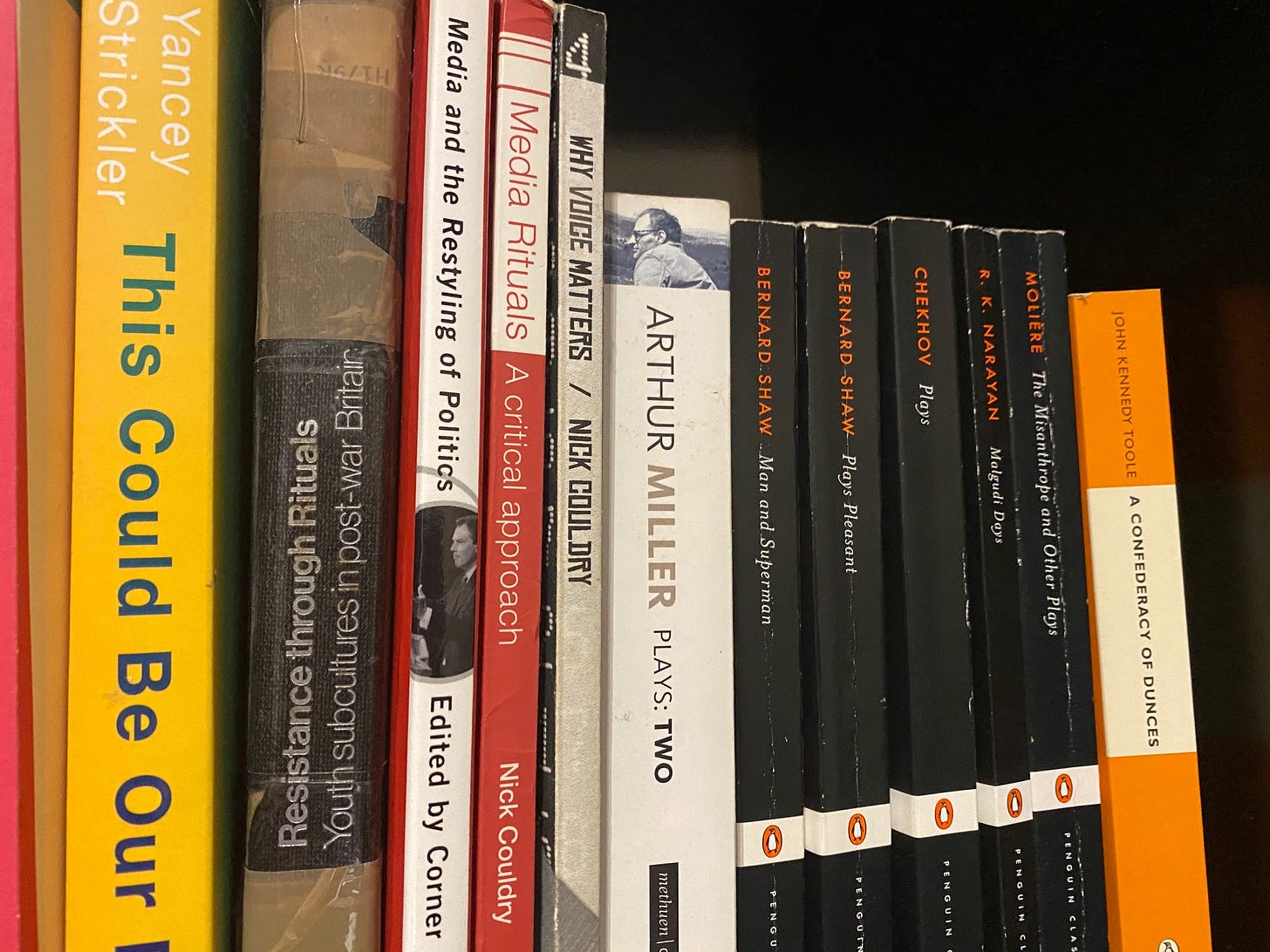Meditations on writing
A treatise on communicating ideas through the written word, one that literary connoisseurs may never endorse, but secretly love. Convention be damned.
Welcome to Wait! Just Listen, a weekly compendium of socio-cultural insights into what people and organisations do in the digital (and sometimes not so digital) space. If this type of content tickles your fancy or any other part of your intellectual self, please consider subscribing.
“As a writer you should not judge. You should understand” - Ernest Hemingway, 1935
I once wrote short story in high school about the life of a fraying English dictionary, titled, “A personality of words”. It was a 12-page raffia bound story in which the eponymous narrator describes the daily adventures of this dictionary in question; from being brought to school, carelessly shared with friends, and strewn around in games of scrabble, finally meeting an abrupt end through an unfortunate coffee spill. It wasn’t my magnum opus or even worthy of a spot in the local school library. It was however a story that would mark my burgeoning love for the written word.

This essay represents a slight departure from the digital focus of previous essays. It provides a guided tour (and a walk down memory-lane for myself) on methods and tips I’ve learnt through the writing craft. Some are curiously unconventional yet crucial to my *pen-wielding exploits.
*‘Keyboard-wielding’ doesn’t have quite the same dramatic ring to it.
Planning and writing are not natural bedfellows (at least for me)
I rarely plan when writing. In fact if memory serves me right, the only writing plan I’ve written up to date was for my 50,000 word PhD thesis defence. And only because it was an assessed deliverable. Make no mistake, I’m not wearing my aversion to planning as a badge of honour. I say this from a place of humble honesty. There is a certain beauty and measured calmness in writing through a stream of consciousness. A plan is cobbled together as you write rather than before you write. The words seem to have a more effortless and natural feel about them while the sentences appear less contrived and more conversational, inviting and assuring.
My fingers take a life of its own the moment they hover over the keyboard. Ballpoint pens are sadly out of fashion in my house. The kids use them as little sticks to collect pet ants instead. No idea what their infatuation with ants are about. Sorry I digress.
The lack of a plan spurs me on to think laterally and examine various issues from vantage points that an ‘organised me’ would never venture towards. There are no rules here, no boundaries and no caveats. William James had a wonderful analogy of this in relation to human consciousness:
Consciousness … does not appear to itself chopped up in bits. …It is nothing jointed; it flows. A ‘river’ or ‘stream’ are the metaphors by which it is most naturally described.”
– William James in Psychology, Chapter XI.
In many ways, the lack of planning creates a cathartic experience of simply letting loose and bearing witness to how ideas in your head transpire in various sequences, some more coherent than others. It is only through this experimental process do you become aware of your ideas; some have a level of maturity and sophistication beyond belief while others remain magically innocent, juvenile and incomplete. It is all part of the experience and craft.
It is often said that your authentic voice is one that organically surfaces without a need for coaxing. It speaks a language that is imprinted with your unique DNA and one that is bellied with such sincerity it piques even the most hardened reader.
Perhaps all it takes to write an unplanned piece is to simply plan to not have a plan.
Practical tip: Imagine yourself as a protagonist. There doesn’t have to be a pre-defined story. Take a blank piece of paper and write anything that comes into your head, be it in prose or a more metrical form. Observe how your thought process ebbs and flows. You would be surprised at how much you learn about yourself and the style of writing that you have naturally assimilated.
Savour different opinions, even the ones that sit uncomfortably
I’ve become a better writer by simply embracing the tension and following those whose views I inherently disagree with. There is growth in confronting ideas that challenge your perception. Exploring that disquiet with non-judgement and even wonderment is inspiring both on the intellectual and writing front. So is building a sense of empathy and context around a variety of ideas and ideations.

We have been programmed to seek validation and endorsement as a social species. This has in some ways precluded us from connecting with views different from our own. There is nothing wrong with seeking acknowledgement. It is the fuel that spurs our desire to write. I do it all the time. In fact, at the end of this article, you would be greeted with a short paragraph asking you to subscribe which, if you do, would serve as an indicator to me that you like my work. Heck, I’ll even place a button below this paragraph to prove my point.
Social media and sociality in general however have taken validation-seeking a step further. Ideologically similar voices tend to coalesce while dissenting views are vehemently disparaged and at times disregarded without cause. I will not refer to this as cancel culture because that term has been somewhat bastardised and politicised in mainstream parlance.
What I will say however is that reading an essay/article/tweet with disagreement is a way more valuable exercise than most people give it credit for. It compels you to question how the author could possibly (much to your utter bewilderment) arrive at a particular stance. That is a priceless educational moment no creative writing class will ever convey.
I find that tracing someones thought process and intellectual history is an adventure on its own. Carefully piecing apart the myriad of sub-plots, motivations, assumptions that have somehow culminated into a specific view of the world. It is fascinating. It is the kind of work that good biographers are masterful at - meticulously unravelling each layered veil of a life story with enough dexterity to leave you wanting more.
Practical tip: Start by following the work of 2 people who hold distinctly different world-views from yourself. Note down presumable trains of thought, assumptions and conclusions and do it without judgement. The stuff that you won’t usually do because you are too busy blocking them off. After the exercise, ask yourself if the work of these authors resonate with you in the same way as it did before. What was different or similar about it? You’ll still disagree with the view, but you will have an added appreciation of its origins, not matter how whacky, offensive or trivial.
Read voraciously but purposefully
I subscribe to over 20 online newsletters and read a couple of books a month. They have been carefully curated to the point where I would be able to easily tell you my reasons for reading a particular piece or rather why it has drawn my attention. I have to be ruthless with my time because I have very little of it. Having boisterous sons who crave your undivided attention is wonderful (it really is). But it also economises the time you have for other literary pursuits that don’t involve Bluey or Peppa Pig.
There is an arbitrary, haphazard quality to the books in my house. Works of English classics sit proudly on the top shelve of my bookcase. Like fine wine, they get better with age. The other shelves have a solid presence of philosophical writings from well-worn classics like Kant to the contemporary insights of AC Grayling. Philosophy may be viewed as self-indulgent navel gazing to many but it does have its purpose in establishing a way of thinking about the world and the human condition.
I’ve found that the only true way to connect with a reader at an intimate level is to read what others have written. Compelling writing often has an embedded and unspoken form of mutual respect between writer and reader; an emotional transaction that if executed similarly, could be replicated in your own writing. The reader’s perseverance will be duly rewarded through the writer’s authentic quest to communicate. There will be a learning or insight that leaves an impression to savour and inspire for both writer and reader.
Practical tip: Read an article (maybe even from this newsletter) and try to identify that intimate and sacred connection between writer and reader. Do you feel its presence or does it remain obscured? What aspects of the article draw you in or encourage (or discourage) you to connect at an intellectual and/or emotional level? Do its ideas resonate long after you’ve finished reading the piece in question?
Human vulnerability is a master storyteller
As strange as it sounds, we readers (I’ll put down my authorial hat for a moment) like to be reminded of our foibles in being human. The loud burps, crazy kids, mindless outbursts are human traits that carry an enduring warmth. It puts the author and reader on a level playing field, each navigating life’s annoyances and tribulations as fellow explorers on the same journey. Showing your scars speaks to your empathy. That you ride and fall across the topsy-turvy tapestry of life and you are not afraid to tell people about it.
The most human novels and writings I’ve read are those that contain endless self-referentiality and self-doubt. There is a sense of playfulness and wit even in moments of sadness. Humanness (the quality of being human) lends itself beautifully to explorations of emotion and psychological drama; these qualities, in my opinion, should be strategically embraced and employed to spin a glittering yarn that is as much truthful as it is painful, funny and absurd.
Practical tip: Write a short definition of vulnerability from your own life experience. It doesn’t matter if it is wistful, self-lacerating or romantic - just make sure it speaks to your own understanding of feeling insecure. Once you have the paragraph down, find something desperately sad, funny and clever about it and write that down. You would then be faced with the multi-dimensionality of human vulnerability - the perfect spring board from which to tell a gripping tale.
Now something about me…as a writer
I prefer to listen than to speak, to see instead of be seen. Writing then (as I am doing with this newsletter) is the ultimate paradox of my life. But if you think about it, writing has become a channel for me to exercise an agency I have not exerted before or at least not with as much conviction. The life of an academic and researcher (my day job) is one of structure - journal papers and book chapter publications often have to be rigorously grounded in empiricism and supported with theory. Alot of its content is massaged to fit within very specific institutional demands. The creative licence to reconceive, rearrange and reconstitute reality as how I see it - my ‘listen to me’ moment - is a benefit that this newsletter affords and one that I have come to cherish with open arms. And besides, it won’t be in danger of wilting in the event of a coffee spill.
Please share this article and subscribe. It would mean alot.
If you enjoyed this, please consider sharing this article with someone who might appreciate it just as much as you did. Also, if you want these regularly in your inbox, please subscribe for free below. I’ll also be offering more detailed digital research related thoughts and insights including writing advice as subscriber-only content. Twitter: @joshtrippingwords




I truly love this article - written for a relaxed but yet a literary appreciation of the work. It also reflects the author's prolific power of analysis and insights, voracious reading habit, and also his ability to relate to the realities of life. I thoroughly enjoyed reading this.